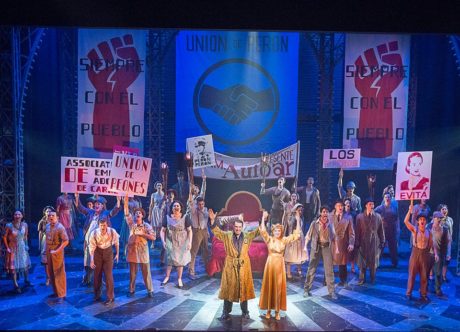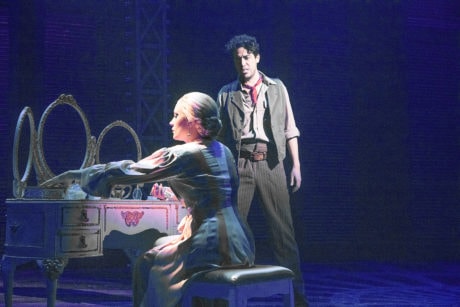The life of Eva Perón is the stuff legends, and rock operas, are made of: a rags-to-riches story of a poor illegitimate child from provincial Argentina, whose ambitious determination, seductive beauty, and audacious opportunism result in a meteoric rise to fame and fortune, first as an actress and model, then as her country’s First Lady, only to be cut short by her tragic illness and death at the age of 33. Opening the Pennsylvania Shakespeare Festival’s summer season, with its largest-ever ensemble and the highest advance ticket sales in its history, is Evita, the 1979 Tony Award-winning musical spectacular with lyrics by Tim Rice and music by Andrew Lloyd Webber.

Directed by Dennis Razze (Associate Artistic Director of PSF), a powerhouse trio of Broadway luminaries leads a cast of 40 through the key years of Perón’s sung-through biography, beginning with the news of her death and funeral in 1952 (in which the full ensemble honors her with a haunting “Requiem for Evita”), then reviewing her ascent in a flashback story starting in 1934, when the then fifteen-year-old Eva Duarte (b. 1919) began her expeditious (and oftentimes ruthless) climb to the top. The show’s well-known eclectic score, combining the styles of Latin rhythms, rock-and-roll beats, and choral hymns, is masterfully performed by the company and a fifteen-piece live orchestra, under the impressive music direction of Conductor Nathan Diehl.
Dee Roscioli (an alumna of DeSales University, which houses the PSF) stars as Evita, bringing her clear rich powerful voice and a sense of empathy with her character’s motivations to the iconic balcony scene and the blockbuster hit “Don’t Cry for Me Argentina.” Roscioli plays the role with more vulnerability and desperation than earthiness or grit, giving an understanding of the youthful charm and sexual attractiveness she used to realize her transparent aspirations for a better life of luxury and authority, her equivocal reasons for taking up the cause of the “descamisados” and working class, and the indignation she felt when rejected by international leaders and the elite of her own country.
As Juan Perón, acclaimed actor and opera singer Paulo Szot portrays the strength of the military leader who assumes power in a metaphorical game of musical chairs, joins forces with Evita to win the Presidency, and revels in “The Art of the Possible” and “A New Argentina,” in which he systematicallly squelches any opposition to his rule. Szot’s renowned resonant baritone is a perfect fit for the character, who later expresses growing concern for his waning support and his dying wife (“She Is a Diamond” and “Dice Are Rolling”).
Directly addressing the audience with his running socio-political commentary, disdainful observations, wry facial expressions, and sardonic songs, Dan Domenech in his show-stealing appearance as Che – a one-man chorus, narrator, and antagonist loosely referencing Argentine-born Che Guevara – has all the conviction of a revolutionary and the charisma of a rock star. He commands our attention every second he is on stage, appealing to us with his critical appraisals, engaging eye contact, and confident demeanor. Whether featured in a song (the contemptuous “Oh, What a Circus,” “Perón’s Latest Flame,” “High Flying, Adored,” “And the Money Kept Rolling In”), dance (“Waltz for Eva and Che”), or is just a part of the large crowd, it’s hard to take your eyes off him or to fail to be swayed by his bravado.

Among the most comical moments of the show are Che’s feigned Italian and French accents of the Europeans reacting to Evita’s “Rainbow Tour.” The many musical highlights include the ebullient “Buenos Aires,” performed by Eva with Che and company. Other noteworthy numbers are “Another Suitcase in Another Hall,” poignantly sung by Jerusha Cavazos as Perón’s Mistress, dismissed and replaced by Evita; and the adoring hymn to “Santa Evita” by the children and mourners at her funeral. Stephen Casey’s ambitious choreography is in tune with the varied musical genres, with appropriately lively and engaging Latin dances by the whole ensemble. There were, however, shaky moments on opening night in the execution of the featured couple’s tango and some out-of-synch maneuvers in the recurrent military marches.
Scenic Designer Steve TenEyck’s grand openwork arches with marquee bulbs and a movable metal balcony provide a towering framework for the changing indoor and outdoor locations, supplemented by Arianna Knapp’s black-and-white video projections of vintage photographs and news footage of Evita and her era. Lisa Zinni’s lavish period-style costumes give precise indications of the characters’ classes and positions, and the increasingly glamorous fashions Evita wore, from the copious furs and jewelry to the famed white gown by Christian Dior, in which she addressed the masses.
Was she a saint or sinner, shining star or anti-heroine? The Pennsylvania Shakespeare Festival’s production of Evita succeeds in showing both sides of the woman, the opinions of the people, and the world’s reaction to her, with exciting music, compelling performances, and an eye-popping design.
Running Time: Approximately two hours and 15 minutes, including a 15-minute intermission.
Evita plays through Sunday, July 2, 2017 at the Pennsylvania Shakespeare Festival, Main Stage – 2755 Station Avenue, in Center Valley, PA, on the Campus of DeSales University. For tickets, call (610) 282-WILL, or purchase them online.





